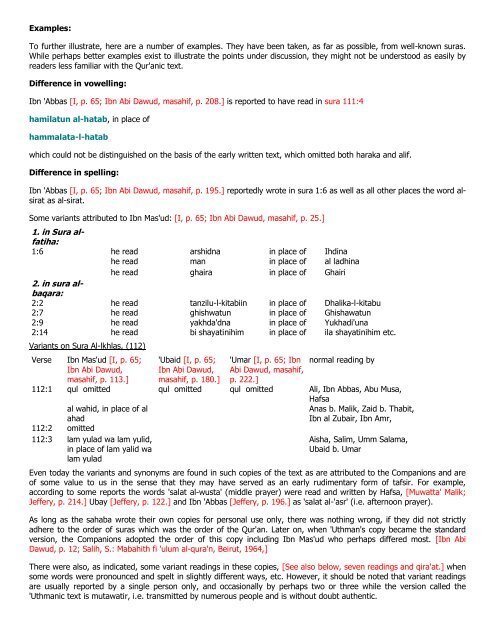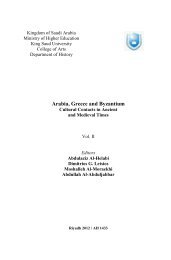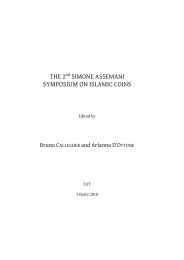ulum-al-quran
ulum-al-quran
ulum-al-quran
Create successful ePaper yourself
Turn your PDF publications into a flip-book with our unique Google optimized e-Paper software.
Examples:<br />
To further illustrate, here are a number of examples. They have been taken, as far as possible, from well-known suras.<br />
While perhaps better examples exist to illustrate the points under discussion, they might not be understood as easily by<br />
readers less familiar with the Qur'anic text.<br />
Difference in vowelling:<br />
Ibn 'Abbas [I, p. 65; Ibn Abi Dawud, masahif, p. 208.] is reported to have read in sura 111:4<br />
hamilatun <strong>al</strong>-hatab, in place of<br />
hamm<strong>al</strong>ata-l-hatab<br />
which could not be distinguished on the basis of the early written text, which omitted both haraka and <strong>al</strong>if.<br />
Difference in spelling:<br />
Ibn 'Abbas [I, p. 65; Ibn Abi Dawud, masahif, p. 195.] reportedly wrote in sura 1:6 as well as <strong>al</strong>l other places the word <strong>al</strong>sirat<br />
as <strong>al</strong>-sirat.<br />
Some variants attributed to Ibn Mas'ud: [I, p. 65; Ibn Abi Dawud, masahif, p. 25.]<br />
1. in Sura <strong>al</strong>fatiha:<br />
1:6 he read arshidna in place of Ihdina<br />
he read man in place of <strong>al</strong> ladhina<br />
he read ghaira in place of Ghairi<br />
2. in sura <strong>al</strong>baqara:<br />
2:2 he read tanzilu-l-kitabiin in place of Dh<strong>al</strong>ika-l-kitabu<br />
2:7 he read ghishwatun in place of Ghishawatun<br />
2:9 he read yakhda'dna in place of Yukhadi'una<br />
2:14 he read bi shayatinihim in place of ila shayatinihim etc.<br />
Variants on Sura Al-lkhlas, (112)<br />
Verse Ibn Mas'ud [I, p. 65;<br />
Ibn Abi Dawud,<br />
masahif, p. 113.]<br />
'Ubaid [I, p. 65;<br />
Ibn Abi Dawud,<br />
masahif, p. 180.]<br />
'Umar [I, p. 65; Ibn<br />
Abi Dawud, masahif,<br />
p. 222.]<br />
norm<strong>al</strong> reading by<br />
112:1 qul omitted qul omitted qul omitted Ali, Ibn Abbas, Abu Musa,<br />
Hafsa<br />
<strong>al</strong> wahid, in place of <strong>al</strong><br />
ahad<br />
Anas b. M<strong>al</strong>ik, Zaid b. Thabit,<br />
Ibn <strong>al</strong> Zubair, Ibn Amr,<br />
112:2 omitted<br />
112:3 lam yulad wa lam yulid,<br />
in place of lam y<strong>al</strong>id wa<br />
lam yulad<br />
Aisha, S<strong>al</strong>im, Umm S<strong>al</strong>ama,<br />
Ubaid b. Umar<br />
Even today the variants and synonyms are found in such copies of the text as are attributed to the Companions and are<br />
of some v<strong>al</strong>ue to us in the sense that they may have served as an early rudimentary form of tafsir. For example,<br />
according to some reports the words 's<strong>al</strong>at <strong>al</strong>-wusta' (middle prayer) were read and written by Hafsa, [Muwatta' M<strong>al</strong>ik;<br />
Jeffery, p. 214.] Ubay [Jeffery, p. 122.] and Ibn 'Abbas [Jeffery, p. 196.] as 's<strong>al</strong>at <strong>al</strong>-'asr' (i.e. afternoon prayer).<br />
As long as the sahaba wrote their own copies for person<strong>al</strong> use only, there was nothing wrong, if they did not strictly<br />
adhere to the order of suras which was the order of the Qur'an. Later on, when 'Uthman's copy became the standard<br />
version, the Companions adopted the order of this copy including Ibn Mas'ud who perhaps differed most. [Ibn Abi<br />
Dawud, p. 12; S<strong>al</strong>ih, S.: Mabahith fi '<strong>ulum</strong> <strong>al</strong>-qura'n, Beirut, 1964,]<br />
There were <strong>al</strong>so, as indicated, some variant readings in these copies, [See <strong>al</strong>so below, seven readings and qira'at.] when<br />
some words were pronounced and spelt in slightly different ways, etc. However, it should be noted that variant readings<br />
are usu<strong>al</strong>ly reported by a single person only, and occasion<strong>al</strong>ly by perhaps two or three while the version c<strong>al</strong>led the<br />
'Uthmanic text is mutawatir, i.e. transmitted by numerous people and is without doubt authentic.





